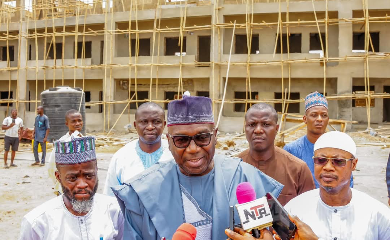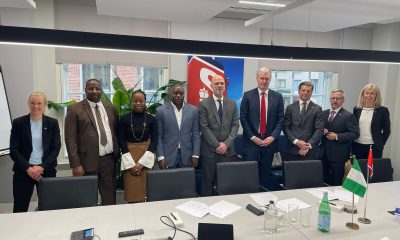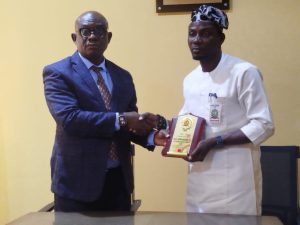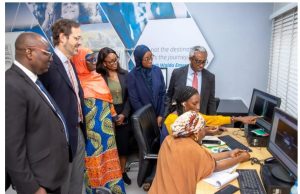news
Police arrest Rivers woman over ₦523,600 ATM card swap fraud

Operatives of the Rivers State Police Command have arrested a woman allegedly involved in an Automated Teller Machine debit card swap fraud worth over ₦500,000 in Port Harcourt.
The police, in a statement issued in Port Harcourt on Tuesday by the command’s spokesperson, Grace Iringe-Koko, identified the suspect as 35-year-old Blessing Oleru.
Iringe-Koko said her arrest followed a report by the victim (name withheld), prompting a swift response from operatives of the command.
The statement partly reads: “The victim, who wishes to remain anonymous, reported the incident on November 26, 2024, at the Olu-Obasanjo Police Station after the suspect swapped his ATM card at a bank along the Garrison axis in Port Harcourt. According to the report, the victim attempted to withdraw cash from an ATM, but the machine malfunctioned.
Oleru, who was standing nearby pretending to carry out a transaction, offered assistance but instead swapped the victim’s debit card. The victim left the ATM without realising what had happened but soon began receiving debit alerts totalling ₦523,600.00.
“Following a coordinated intelligence operation, police operatives arrested Oleru on February 5, 2025. During interrogation, she confessed to the crime, and a Moniepoint Point of Sale (PoS) machine was recovered from her possession.”
Iringe-Koko added, “The investigation is ongoing, with efforts to apprehend other members of the syndicate.This arrest demonstrates the Rivers State Police Command’s commitment to combating financial crimes and protecting citizens’ interests at all times.”
news
Ahmed Raji(SAN) Accomplish Another Landmark Feat, Launch New School Block, Handover Ultra-Modern CBT Center To JAMB.
Renowned legal icon, philanthropist and Senior Advocate of Nigeria (SAN), Alhaji Ahmed Adeniyi Raji, has once again reaffirmed his unwavering commitment to educational advancement as he is getting ready to launch a newly constructed school building and hand-over a modern Computer Based Test (CBT) Centre to Joint Admissions and Matriculation Board (JAMB) in Iseyin, Oyo State.
This historic event, scheduled to hold on Wednesday, February 11, 2026, is expected to attract top educationists, including the Registrar of JAMB, Professor Isiaq Oloyede, who will officially receive the CBT centre on behalf of the examination body.
According to statement issued and signed by Hon. Saheed Adejare Yusuf Alaran, brother, development partner to the legal luminary and made available to media, said this intervention initiative is part of Alhaji Raji’s long-standing vision to make quality education affordable, accessible and all-inclusive, irrespective of students’ socio-economic background.
Hon. Adejare Yusuf Alaran disclosed that the legal icon has taken full responsibility for the construction of a modern school complex comprising classrooms, administrative offices and fully equipped laboratories for the Senior Secondary arm of Raji Okeesa Memorial Comprehensive High School. The new facilities are designed to enhance teaching, learning and overall academic excellence.
In addition, Alhaji Raji has also built a well-equipped JAMB CBT Centre with a seating capacity of 250 candidates, fitted to meet global examination standards. The centre is expected to significantly ease the burden on students who previously travelled long distances to sit for UTME examinations.
Hon. Adejare Yusuf Alaran further noted that the official unveiling and handover will ensure the CBT centre is efficiently managed by JAMB for optimal use. He stressed that the initiative would save thousands of youths from avoidable stress while promoting fairness and efficiency in examination processes.
With this latest gesture, Alhaji Raji has once again etched his name in gold as a steadfast champion of education and youth empowerment in Oyo State and beyond.
news
*Oyo Govt. Plans 60,000 Laptops for WAEC CBT*
Oyo State Government has reaffirmed its preparedness for the official commencement of the Computer-Based Test (CBT) mode of the West African Examinations Council (WAEC) examinations.
This is in line with the Federal Government’s directive for a gradual transition from pen-and-paper to full digital testing.
The Commissioner for Education, Science and Technology, Hon. Olusegun Olayiwola, disclosed this while receiving the Zonal Coordinator and Deputy Registrar of West African Examination Council(WAEC), Mr. Waheed Amode, and his management team during a courtesy visit to his office on Wednesday, February 4, 2026.
Olayiwola revealed that Oyo State Governor, Engr. Seyi Makinde has directed that the cost implications for the procurement of over 60,000 laptops for public senior secondary schools across the state be worked out, noting that the move is aimed at positioning Oyo State ahead of the full adoption of CBT examinations.
He commended WAEC for the proactive measures taken to address the challenges experienced during the 2025 examinations, while pledging the Ministry’s continued support in curbing examination malpractice and preventing vandalisation of school facilities.
In his remarks, Amode said the visit was to appreciate the Oyo State Ministry of Education for its support during the 2025 WAEC examinations and for its consistent collaboration with the Council over the years, describing the Ministry as a key stakeholder in the success of WAEC operations.
He disclosed that registration for the 2026 May/June WAEC examination closed on 2nd February, 2026, adding that the forthcoming examinations would be conducted using both CBT and pen-and-paper modes depending on the readiness of individual schools, while schools interested in full CBT participation are expected to formally indicate their interest through official correspondence.
Amode also warned that severe penalties await any candidate caught with mobile phones in the examination hall.
He stressed that such misconduct could lead to the cancellation of an entire school’s results, depending on the circumstances, and urged principals and teachers to uphold integrity in order to strengthen educational standards.
Meanwhile, Honourable Olusegun Olayiwola has called on parents, guardians and teachers to strengthen collaboration in order to address moral decline in schools, noting that effective partnership between the home and the school is essential for raising disciplined, responsible and value-driven students.
The Commissioner made the call while receiving members of the National Education Reform Movement (NERM), urging stakeholders to prioritise discipline and quality teaching, while NERM leader, Mr. Adewumi Abass, warned that weak parent–teacher synergy and rising examination malpractice pose serious threats to Nigeria’s education system and recommended the use of the resource book, “Parenting for Excellence,” as a guide for improvement.
news
*Oyo NUJ Celebrates Patron, Olooye Taofeek Adegoke on Birthday*
The Nigeria Union of Journalists (NUJ), Oyo State Council, has congratulated a distinguished Patron and renowned mediapreneur, Olooye Adeboyega Taofeek Adegoke, on the occasion of his birthday, describing him as a pillar of support for journalists and media development in the state.
In a congratulatory statement jointly signed by the Chairman, Mr. Akeem Abas, and Secretary, Dayo Adu, the Council extolled Oloye Adegoke’s outstanding commitment to the growth of the Union and the welfare of its members.
The council noted that as a responsible and dependable Patron, Oloye Adegoke has consistently demonstrated deep passion for the progress of journalism, maintaining a cordial and mutually beneficial relationship with the NUJ Oyo State Council.
It added that his unreserved benevolence to the Union and to journalists who cross his path, stressing that his interventions and support have positively impacted many practitioners within the media space.
According to the Council, the celebrant has remained a strong pillar behind several NUJ programmes and activities, offering support that has contributed immensely to the successful execution of professional and welfare-driven initiatives.
The Union particularly commended his rare gesture of giving without demanding anything in return, describing his selflessness as a virtue worthy of emulation within and outside the media industry.
Oyo NUJ added that Oloye Adegoke’s contributions as a mediapreneur have also helped in advancing media enterprise, capacity building, and opportunities for journalists across the state.
The Council wished him a happy birthday and prayed for continued good health, greater accomplishments, and more impactful years in service to humanity and the journalism profession.
news
*Oyo NUJ Pledge Joint Action Against Misinformation*
The Department of State Services (DSS) in Oyo State has reiterated its commitment to working closely with the Nigeria Union of Journalists (NUJ) to address security challenges and curb the activities of fifth columnists.
The State Director of DSS , Mr. Rasheed Adelakun, made this known when the executives of the NUJ, Oyo State Council, led by its Chairman, Mr. Akeem Abas, paid a courtesy visit to the state headquarters of the service in Ibadan.
Adelakun described the media as a critical partner in national security, stressing that effective information management and responsible reportage were essential tools to sustaining peace and stability.
He expressed concern over the increasing activities of fifth columnists, warning that their actions pose grave dangers to national security and peaceful coexistence.
According to him, the spread of misinformation and unverified reports could be exploited by such elements to undermine public confidence and social cohesion.
Adelakun, therefore, urged journalists to uphold professionalism and ethical standards in the discharge of their duties in the interest of national development.
Earlier in his remarks, the Oyo NUJ Chairman, Mr. Akeem Abas, assured the DSS of the union’s readiness to sustain collaboration with security agencies to promote peace, security and unity in Oyo State and across the country.
Abas added that NUJ would continue to sensitise its members on the importance of responsible journalism, fact-checking and adherence to ethical standards, noting that accurate and timely information remains a vital tool in supporting security agencies and strengthening national cohesion.
news
One Death Too Many: Government Must Be Held Accountable ““The opposite of love is not hate, it is indifference.”- Elie Wiesel – By Lanre Ogundipe
There are moments in the life of a nation when condolences become an insult. The massacre in the Woro and Nuku communities of Kaiama Local Government, Kwara State is one such moment.
Over one hundred and sixty Nigerians men, women and children were rounded up, bound, and executed in cold blood.
Not in a war zone. Not in a declared battlefield. But in their homes, on their farms, in the ordinary spaces of daily life where citizens are supposed to be protected by the state.
In response, government spoke. It always speaks. Condolences were offered. Troops were deployed after the fact. Statements were issued. And then silence followed, the familiar Nigerian silence that descends after tragedy, as though the mere passage of time could substitute for justice.
But when citizens are slaughtered in one coordinated attack and the primary response is sympathy, the issue is no longer insecurity alone. It is governance failure.
When warnings are ignored, graves multiply.
Several years ago, a former Chief of Army Staff and Minister of Defence publicly expressed loss of confidence in the ability of Nigeria’s security architecture to protect its citizens. He warned that communities were becoming sitting targets and suggested that citizens might have to defend themselves. At the time, the statement was controversial. Some dismissed it as reckless; others saw it as frustration.
Today, after repeated mass killings across the North-Central, the North-West, parts of the Middle Belt, and now creeping steadily into the South-West, that warning no longer sounds extreme. It sounds like an unaddressed alarm.
When a figure who once sat at the heart of the military establishment openly questions the system’s effectiveness, responsible governance demands inquiry and reform. Instead, the system closed ranks. The result is visible in mass graves.
Missing weapons, unanswered questions
Nigeria’s insecurity is sustained not only by ideology but by logistics. Armed groups operate with weapons, ammunition, intelligence and mobility. This raises a fundamental question that has never been satisfactorily answered: how do non-state actors consistently acquire arms in such quantities in a country with supposedly regulated armouries?
Over the years, there have been persistent allegations of missing or diverted weapons from police and military stockpiles. Senate inquiries have been announced. Committees have been formed. Investigations have been promised. Yet the outcomes remain largely invisible to the public.
Weapons do not simply disappear in a functioning state. When they do, and no one is held accountable, it creates an environment where criminal networks thrive. Citizens are entitled to know whether arms procured with public funds to defend them have been mismanaged, diverted, or abandoned to corruption.
Until there is a transparent forensic audit of arms procurement, storage and deployment, every massacre will raise the same disturbing suspicion: that state failure is not accidental.
Security agencies under scrutiny.
It must be stated clearly: many officers have paid with their lives trying to protect communities. Their sacrifice deserves respect. But institutions are judged by outcomes, not intentions.
Nigeria’s security agencies have long struggled with poor intelligence coordination, slow response times, weak oversight, and public trust deficits.
Allegations of corruption, abuse of power and selective enforcement are not new.
They are part of a documented pattern that has eroded confidence between citizens and those tasked with protecting them.
When attacks occur despite repeated warnings, when perpetrators operate for hours without resistance, and when accountability rarely follows, citizens are justified in asking whether the problem is merely incompetence or something deeper.
Asking such questions is not an attack on the uniform. It is a demand for institutional accountability.
Violence reaches the South-West.
For years, the South-West assumed a measure of insulation from the scale of violence seen elsewhere.
That assumption is now dangerously outdated. Criminal networks and extremist violence have found entry points into parts of Osun State through Ora-Igbomina and surrounding communities.
Farmers are afraid to work their land. Families fear nightfall. The early warning signs are unmistakable.
Yet political leadership appears distracted by ceremonies, anniversaries and public celebrations. At a time when security coordination should dominate governance priorities, optics and pageantry seem to take precedence.
Leadership is not measured by appearances in moments of comfort, but by decisiveness in moments of crisis.
Unequal seriousness across regions
Across Nigeria, a contrast is emerging. Some states, particularly in parts of the East and South-South, are investing in intelligence gathering, technological support, community surveillance and structured engagement with security professionals. These efforts are not perfect, but they demonstrate seriousness.
The question is unavoidable: what are other states prioritising? What value does infrastructure, celebration or political theatre hold when citizens are unsafe? Development without security is an illusion.
Security is not one policy item among many. It is the foundation upon which every other policy rests.
Beyond religion and ethnicity.
This tragedy must not be misrepresented as religious or ethnic conflict. Terror does not discriminate by faith. Bullets do not recognise identity. Christian or Muslim, Yoruba or Hausa or Igbo — the dead are united by vulnerability, not belief.
Reducing these massacres to sectarian narratives only benefits those who profit from chaos. The real divide is between citizens protected by power and citizens exposed to violence.
A government that cannot protect its people, regardless of who they are or what they believe, has failed its most basic obligation.
The dangerous appeal of self-help
In the face of repeated state failure, some citizens ask whether they must protect themselves. This is not rebellion; it is despair. But history shows that widespread vigilantism leads not to safety, but to cycles of revenge and instability.
The alternative is not lawlessness. It is accountability.
Citizens must demand:
Transparent investigations into security failures before and during major attacks.
A full forensic audit of missing or diverted weapons.
Clear responsibility for governors, commissioners and security chiefs where negligence is established.
Lawful, supervised community protection mechanisms under strict oversight.
Anything less is performance, not governance.
A quiet erosion of freedom.
There is an uncomfortable question many Nigerians now ask privately: are citizens valued only as statistics — to be governed, taxed, and mourned, but not protected?
When deaths are normalised and accountability is endlessly postponed, freedom becomes symbolic rather than real. Democracy cannot survive where life is cheap and power is insulated from consequence.
One death is too many
Let us return to the central truth. One death is too many. One hundred and sixty is a national indictment.
This massacre must not be absorbed into Nigeria’s long list of forgotten tragedies.
Condolences cannot replace justice. Silence cannot replace accountability.
History will ask what was done when citizens were slaughtered. Words alone will not be an acceptable answer.
Lanre Ogundipe , A Public Affairs Analyst, Former President Nigeria and Africa Union of Journalists writes from Abuja, Federal Capital City.
February 6, 2026.
news
*UI College of Medicine Alumni Lead Nigeria’s Cancer Care Revolution* – By Tunji Oladejo
*A landmark clinical trial is underway in Nigeria, thanks to the collaborative efforts of Obafemi Awolowo University, Lagos University Teaching Hospital, Medserve and Memorial Sloan Kettering Cancer Centre. The trial investigates PD-1 blockade immunotherapy in patients with mismatch-repair-deficient colorectal cancer. The trial was approved by the National Health Research Ethics Committee (NHREC)—the organization responsible for ensuring that all health research conducted in Nigeria is ethical and globally compliant—and by the National Agency for Food and Drug Administration and Control (NAFDAC), the organisation that regulates and controls the manufacture, importation, exportation, distribution, advertisement, sale, and use of food, drugs, cosmetics, medical devices, packaged water, chemicals and detergents in Nigeria.*
This is a moment of great pride for the University of Ibadan (UI) College of Medicine! Three distinguished UI College of Medicine alumni: Dr Lilian Ekpo, Dr Zainab Yunusa-Kaltungo and Dr Tolu Adewole are instrumental in this initiative. They are part of a groundbreaking clinical trial that’s set to revolutionise colorectal cancer treatment in Nigeria. Their expertise underscores the institution’s commitment to advancing cancer research and treatment.
Dr Abraham Ariyo, a UI College of Medicine alumnus and cardiologist based in the US, shared this exciting news with me. We’d connected online about 4 months ago, bonding over our shared interest in UI and the College of Medicine. As he said, “I have read your pieces about Ibadanland and the University of Ibadan, especially about Profs. Ronke Baiyeroju and Olayinka Omigbodun. You are interested in UI and Ibadan. You are engaging in similar efforts with me regarding the alumni of the Ibadan College of Medicine. I appreciate you.” He’s been sharing stories about notable alumni achievements and this immunotherapy trial is the latest feat!
Back to the basics! This trial is a major turning point in Nigeria’s fight against cancer, with potential implications for sub-Saharan Africa. Alumni contributions reinforce the UI College of Medicine’s reputation as a hub for innovative research.
This trial’s success could establish Nigeria as a frontrunner in cancer research, demonstrating the nation’s capacity to tackle urgent health concerns. Kudos to the UI College of Medicine for nurturing talented professionals who are making a difference!
The trial is partially funded by the Thompson Family Foundation. Co-principal investigator Prof. Olusegun Isaac Alatise says, “The approval marks an important milestone in the fight against colorectal cancer in Nigeria.” Co-principal investigator Prof. Fatimah Abdulkareem adds, “This collaboration demonstrates our commitment to advancing cancer care.”
MSK’s Global Cancer Research and Training programme partnered with OAU Teaching Hospital in 2013 to establish the African Research Group for Oncology. Dr T. Peter Kingham says, “We hope this trial will lead to a similar shift in treatment possibilities for Nigerian colorectal cancer patients.”
Dr Tolulope Adewole, Medserve CEO, emphasises, “Quality oncology care should not be a privilege; it must be the minimum standard irrespective of location.”
If any advanced medical innovation occurs in Nigeria, UI alumni are likely behind it. They might not always be in the spotlight, but they are driving progress.
Globally, colorectal cancer is a significant issue, and Nigeria is not an exception, with less than half of Nigerian patients with colorectal cancer living one year after diagnosis. Colorectal cancer is a type of cancer that typically affects the colon or rectum, often presenting with no symptoms at first. But when it progresses, it can be tough to treat.
Some common signs to watch out for are changes in bowel habits (like diarrhoea or constipation); blood in stool or rectal bleeding; abdominal pain or cramps; unexplained weight loss; and Fatigue
Risk factors include age (50+); family history; diet (low fibre, high processed meat); lack of exercise; and smoking and heavy drinking.
Screening is key! Procedures like colonoscopies can catch it early when it is more treatable. The good news is that research is advancing, and treatments like immunotherapy (like the trial mentioned above) are offering new hope. Stay proactive about your health, and get checked if you’re due!
Tunji Oladejo, mnipr, JP, writes from the University of Ibadan and is the Chairman of The Progressive Forum, Ibadan (TPFI) via oladejo65@gmail.com
-

 news11 months ago
news11 months agoInterrogating the connection between social service and charity
-
news2 months ago
Arrive Early To Examination Centers, Comport Yourselves – Oyo HOS Admonishes Civil/Public Servants
-
news10 months ago
ANPP block in APC expresses deep concern over marginalisation to re-evaluate membership
-
news8 months ago
LG Commission Chairman ‘Wolekanle’ Gets Oyo NULGE’s Support
-

 news11 months ago
news11 months agoAbdulrazaq Inspects Govt’s Multistorey Prototype School
-

 economics12 months ago
economics12 months agoNNPC Shipping, partners unveil joint venture to boost crude transport
-

 news12 months ago
news12 months agoMan arrested for beating girlfriend to death in Lagos
-

 economics12 months ago
economics12 months agoSubscribers lament as MultiChoice raises DStv subscription by 21%







